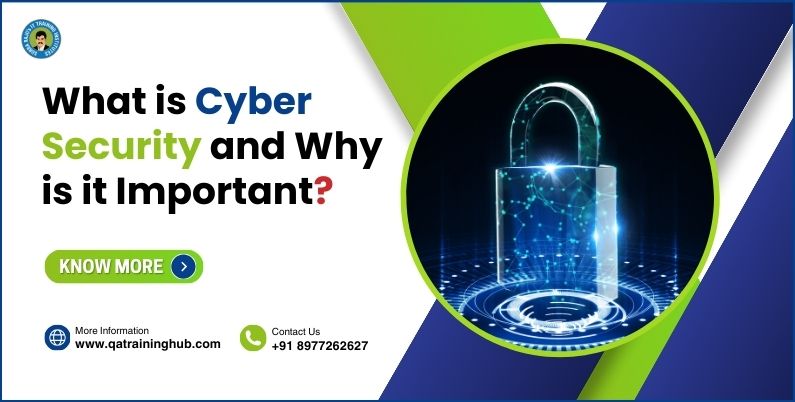
Understanding Cyber Security: Its Importance and Significance
Cyber security has become a major issue for everyone – individuals and businesses. As more devices connect to the internet, and with the rise of the Internet of Things (IoT) and cloud computing, the risk of cyber threats has significantly increased. This blog will explain What is Cyber Security and Why is it Important? the various types of cyber threats, and why it is crucial for safeguarding our digital lives and assets.
Understanding Cyber Security
Cyber security means protecting systems, networks, and programs from digital attacks. These attacks often try to access, change, or destroy sensitive information or disrupt normal business activities. It’s especially hard to implement strong cyber security today because there are more devices than people. Core Principles of Cyber security
Confidentiality: Ensuring that sensitive information is accessible only to those who are authorized to view it.
Integrity: Making sure unauthorized people can’t change information.
Availability: Making sure authorized users can access information and resources whenever they need them.
Key Areas of Cyber Security
Network Security: It ensures that data and resources stay intact, private, and accessible as they move within or across a network.
Information Security: It keeps data safe from being tampered with and ensures its privacy, whether it’s stored or being sent from one place to another.
Application Security: It’s all about keeping software and devices safe from dangers. If an app gets compromised, it might give access to the very data it’s supposed to safeguard.
Operational Security: It involves the steps and choices made to manage and safeguard data assets. This covers what users can do when they use a network and the rules for storing or sharing data, including where and how it’s done.
Disaster Recovery and Business Continuity: It’s all about how an organization deals with a cyber security incident or any event that disrupts operations or data. Disaster recovery policies lay out the plan for getting operations and information back to normal after such an event, aiming to restore everything to how it was before.
End-user Education: It tackles the trickiest aspect of cyber security: people. Anyone can accidentally introduce a virus into an otherwise secure system by failing to follow good security practices.
Types of Cyber Threats
Different types of cyber threats exist, and knowing about them is key to managing cyber security effectively. Here are some of the most common ones:
Malware: Malicious software, like viruses, worms, trojans, spyware, adware, and ransomware, is made to harm, disturb, or get into a computer system without permission.
Phishing: This is a kind of social engineering attack where attackers pretend to be trustworthy sources to deceive people into sharing sensitive information, like usernames, passwords, and credit card numbers.
Man-in-the-Middle (MitM) Attacks: This happens when attackers grab communication between two parties to steal data. For instance, they might snatch data traveling between a visitor’s device and the network through an unsecured Wi-Fi connection.
Denial-of-Service (DoS) Attacks: These attacks flood a network or server with traffic to use up its resources and make it inaccessible to users. Distributed Denial-of-Service (DDoS) attacks work the same way but come from many compromised systems at once.
SQL Injection: This happens when attackers take advantage of weaknesses in a database query to get into the database without permission. They might then steal or change data stored there.
Zero-Day Exploits: These involve taking advantage of software weaknesses that the software maker doesn’t know about yet. They’re particularly risky because they happen before the vulnerability is fixed.
Advanced Persistent Threats (APTs): These are extended and focused cyber attacks where an intruder sneaks into a network and stays hidden for a long time to steal data without getting caught.
The Importance of Cyber security
Cybersecurity is incredibly important in today’s connected world. If it’s not up to scratch, the fallout can be severe, impacting not just the immediate victims but also their customers, partners, and the wider community. Here are some strong reasons why cyber security matters:
Protecting Sensitive Data
Whether it’s private companies or public institutions, they deal with loads of sensitive data like personal info, financial records, and intellectual property. Cyber security steps make sure this data stays private and safe from unauthorized access and breaches. For individuals, cyber security is key to safeguarding personal info like social security numbers, bank details, and health records from identity theft and fraud.
Maintaining Business Continuity
Cyber attacks can seriously mess up business operations, causing big downtime and financial setbacks. Good cyber security plans help organizations stop, find, and deal with attacks, so they can keep running despite cyber threats. Having plans for business continuity and disaster recovery is a key part of a strong cyber security setup. They help organizations bounce back fast from incidents and keep the damage to their operations as small as possible.
Preserving Brand and Reputation
A single cyber attack can ruin an organization’s reputation for good. Customers, partners, and investors trust companies to safeguard their data and have strong security measures in place. If there’s a breach, it can shatter that trust, and rebuilding it can take years. By putting resources into cyber security, organizations show they’re serious about safeguarding stakeholders’ info and preserving their reputation in the market.
Complying with Legal and Regulatory Requirements
Lots of industries have strict rules about protecting data and privacy. If organizations don’t follow these rules, they can face big fines, lawsuits, and harm to their reputation. Cyber security steps help organizations stick to these rules, making sure they handle and protect data as the law requires. Regulations like the General Data Protection Regulation (GDPR) in Europe and the California Consumer Privacy Act (CCPA) in the US demand tight data protection, making cyber security a must-do legally.
Enabling Technological Advancement
As technology gets better, so do the cyber threats that come with it. Cool stuff like the Internet of Things (IoT), artificial intelligence (AI), and cloud computing bring lots of good stuff, but they also bring new security problems. Cyber security is super important to make sure we can use these technologies safely in our everyday lives. By dealing with the security issues that come with new tech, cyber security helps us keep on making cool new things and growing in the digital age.
Cybersecurity Best Practices
To make cyber security work well, you need to cover everything: people, processes, and technology. Here are some good ways to boost cyber security:
Regularly Update and Patch Systems
Companies that make software and hardware often put out updates and patches to fix security problems. It’s really important to keep your systems updated and patched regularly. This helps guard against known threats and lowers the chance of getting attacked.
Implement Strong Access Controls
Access controls make sure only the right people can get into important data and systems. This means using strong, unique passwords, adding extra layers of security like multi-factor authentication (MFA), and checking who has access regularly to make sure it’s only the ones who really need it.
Educate and Train Employees
Human error is one of the leading causes of cyber security incidents. Regularly educating and training employees on cyber security best practices, such as recognizing phishing attempts, using strong passwords, and reporting suspicious activity, can significantly reduce the risk of a successful attack.
Use Encryption
Encryption keeps data safe by turning it into a code that only the right people can understand. Encrypting sensitive data, whether it’s moving around or sitting still, helps keep it safe from people who shouldn’t be looking at it.
Conduct Regular Security Assessments
Doing regular security checks, like scanning for weaknesses and trying to break in, helps find and fix security problems before bad guys can use them. It’s important to have trained cyber security experts do these checks to make sure they look at everything carefully.
Implement Incident Response Plans
An incident response plan lays out what an organization should do if there’s a cyber security problem. This involves spotting the issue, stopping and getting rid of the threat, getting systems and data back up, and looking back afterward to see what can be done better next time. Having a clear plan like this helps organizations act fast and well to make an attack’s impact as small as possible.
Monitor and Log Network Activity
Keeping an eye on what’s happening in the network all the time and keeping records helps catch and deal with anything fishy right away. Using systems like security information and event management (SIEM) gives useful info and warnings, so organizations can spot and handle possible threats before they become big problems.
The Future of Cybersecurity
The world of cyber security keeps changing as new threats pop up and technology gets better. Here are some things that are shaping what cyber security will look like in the future:
Artificial Intelligence and Machine Learning
AI and machine learning are getting more crucial in cyber security. They can look through tons of data to find patterns or strange things that might show a cyber threat. Security tools powered by AI can make threat detection better, react automatically, and make security stronger overall.
Zero Trust Architecture
The Zero Trust model works on the idea of “never trust, always check.” It means making sure all users and devices are verified before they can access stuff, no matter where they are. Using a Zero Trust setup can really lower the chances of unauthorized access and make security better overall.
Increased Regulation and Compliance
As cyber threats keep getting worse. Organizations will have to keep up with these rules and follow them to avoid getting in trouble with the law and facing penalties.
Focus on IoT Security
With more and more IoT devices around, there are new security problems to deal with. These devices often aren’t very secure and can be easy targets for attacks. Making IoT security better by designing devices well, using safe ways for them to communicate, and updating them regularly will be really important for keeping all these connected gadgets safe.
Conclusion:
In conclusion, cyber security is not merely a technical issue but a fundamental aspect of our digital existence. It’s like a protector for our data, our privacy, and how we live online nowadays. Understanding What is Cyber Security and Why is it important? and is crucial for individuals and businesses. It’s the shield that protects us from a myriad of cyber threats, including malware, phishing, and denial-of-service attacks, ensuring the confidentiality, integrity, and availability of our information and resources.
At QA Training Hub, we understand how important cyber security is in today’s connected world. We offer thorough training programs and resources to help people and organizations boost their cyber defenses, lower risks, and stay on top of new threats. By emphasizing the importance of cyber security and sharing the best ways to stay safe, our goal is to make the digital world a safer place for everyone.
As we think about the future, What is Cyber Security and Why is it important? cyber security will keep changing, bringing new challenges and chances to improve. By welcoming new tech, working together, and staying alert, we can handle these changes with confidence. Let’s work together to make a stronger and safer digital world, where cyber security is always on our minds.

